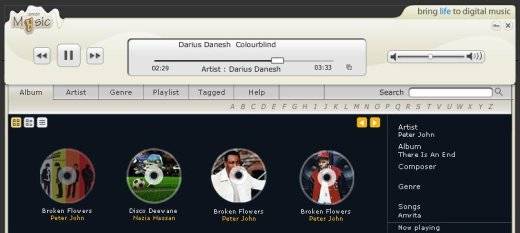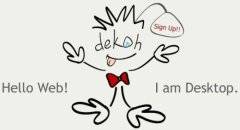After
the tremendous build-up and response
to Adobe’s Apollo platform, which aims to integrate desktop apps with the Web,
we must also remember there are other products trying for the same thing. Dekoh
is one such competitor and, like Adobe’s Apollo, it is in the business of
bringing the browser to the desktop.

Launched in private beta at the end of February, Dekoh is a cross-platform
development framework for deploying Java, Flash, and Ajax applications. Dekoh
itself was built using Java. The public alpha launch of Dekoh is April 15th at
the Web 2.0 Expo in San Francisco.
While Apollo has the benefit of huge financial backing and pre-existing
developer support, Dekoh is aiming to attract developers by providing more
features. Which actually makes it hard to describe what Dekoh is in a sentence.
When Ryan Stewart covered the private beta release of
Dekoh, he implied it was like the WebOS
products that we’ve profiled before on R/WW. Anyway here’s a table showing
the main differences between Dekoh and Apollo (courtesy of the
Dekoh blog):

A full (and very technical) explanation of the differences, at least
according to Dekoh, is on
their blog.
Dekoh: Open Source and has Social Networking features
Possibly the main point of difference is that Dekoh offers an open source
license – unlike the proprietary license of Apollo. This is because Dekoh aims
to create a community around their platform and, because they don’t have the
resources or developer mind share of Adobe, Dekoh has to approach this
differently. What they’ve done is offer social networking aspects to its
developer community. As a Dekoh user you can invite other developers in, create
profile pages and share photos. There are also “web 2.0 features” like
sharing, tagging and commenting. This may hint at a new trend, of deploying an
open source development community around a social networking platform. If
properly executed, this could be enticing and empowering for the developer
community.
An example of a Dekoh app, a music app

Google Calendar Integration
In
speaking with the co-founder of Dekoh, Vijay Pullur, he informed me that for the
alpha they will show at Web 2.0 Expo in April, will include a Google Calendar
offline integration. This product will allow users to synch events from the
desktop with Google calendar. Therefore, you can add events on the go and have
them automatically synched when you are online. It will be part of Dekoh’s range
of applications that can be, with
one click, installed on the desktop portal.

Another interesting feature of this app is the ability to record a personal
alert that will play from the system tray icon, by showing a bubble with the
event description. This is extremely interesting because of the ability to use
devices and the online/offline possibilities we are likely to see in the near
future.
Conclusion
Overall, the main challenge that both Adobe and Dekoh face is to create a
value proposition for the developer community, in order to attract developers
onto their platform – and build a wide array of applications for end-users.
We’re interested in the thoughts of R/WW’s more technical readers, on Dekoh –
how does it compare to Apollo in your eyes?
















